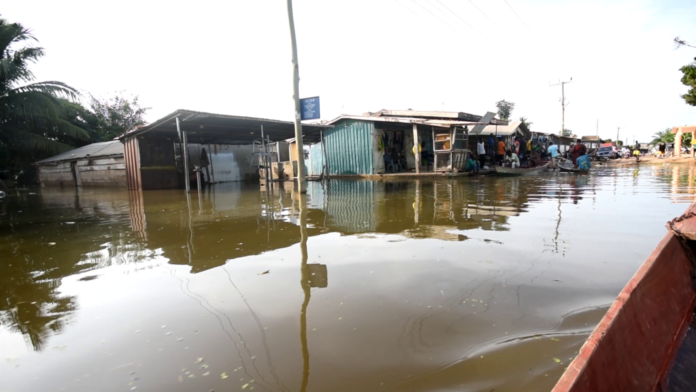
As calls for a probe into the Akosombo Dam disaster intensify, the blame game over who caused the disaster has also heightened.
In a fresh development, the Ghana Meteorological Agency (GMet) has absolved itself of any blame, insisting it provided accurate and timely forecasts to the Volta River Authority (VRA).
Fresh pressure is mounting on the government to probe the Akosombo Dam disaster following the airing of Joy News Hotline documentary “AFTER THE FLOODS.”
The VRA opened the floodgates of the Akosombo Dam in September 2023, affecting about 39,000 Ghanaians downstream. Six months after the disaster, victims who continue to reel under very harsh conditions are demanding answers.
Member of Parliament for North Tongu Constituency, Samuel Okudzeto Ablakwa is disappointed that six months after the disaster, no probe has been launched to establish what went wrong to curtail a recurrence.
“Those who were negligent, those who shirked their responsibilities and caused us all of this pain, this devastation, and this catastrophe must be brought to book. The presidency, did this go to the cabinet, did the cabinet give the green light, what did they check before they gave the green light? We need to know.”
Meanwhile, there is a war of words between the Volta River Authority (VRA) and the Ghana Meteorological Agency (GMet) over who should be blamed for the disaster.
The GMet is furious that the Volta River Authority is trying to blame the disaster on its forecast. Speaking to journalists in Akosombo days after opening the floodgates, the VRA said it based its spill decision on the forecast data provided by the GMet.
“We depend on the Ghana Meteorological Agency for forecasts because the water that comes, it comes through rainfall. At the time, the forecast gave the indication that we were not supposed to expect too much water into the reservoir. The same GMet now issues a new and updated forecast that the situation has changed and we should expect a lot of rain going forward.”
The then Deputy Minister of Energy Herbert Krapah, also confirmed that the VRA’s decision was based on updated forecasts from the GMet.
“They relied on expected information from the meteorological agency. That changed and that changed the course of things.”
But the head of central analysis and forecasts at the GMET, Felicity Ahafianyo, vehemently disagrees, insisting adequate data was provided ahead of time to the VRA.
“Our forecasts did not change, the documents are all there, and it’s a public document. Whatever we send to them is also made available online and you can pick it and read it. Last year, the seasonal forecast came out on the 10th of March 2023 in the presence of the media and other stakeholders. This document was sent to the VRA.”
She added “The forecasts for last year predicted that some areas are going to experience above rainfall for the 2023 seasons and the minor too when it was out, it was also having the same indicators that most areas are likely to have above the normal rainy season that we know, of which it was communicated to the VRA. In this particular case, we cannot be blamed for that.”
The government is yet to launch a formal probe into the disaster that affected the lives of about 39,000 Ghanaians.
Victims say they are not certain as to what the government intends to do regarding resettlement and compensations. About a month ago, the National Disaster Management Organization (NADMO) held an after-review technical session on the disaster with key stakeholders including the VRA. That report is yet to be made public as victims continue to reel under very harsh conditions aftermath.
Source:
www.adomonline.com
Source link

